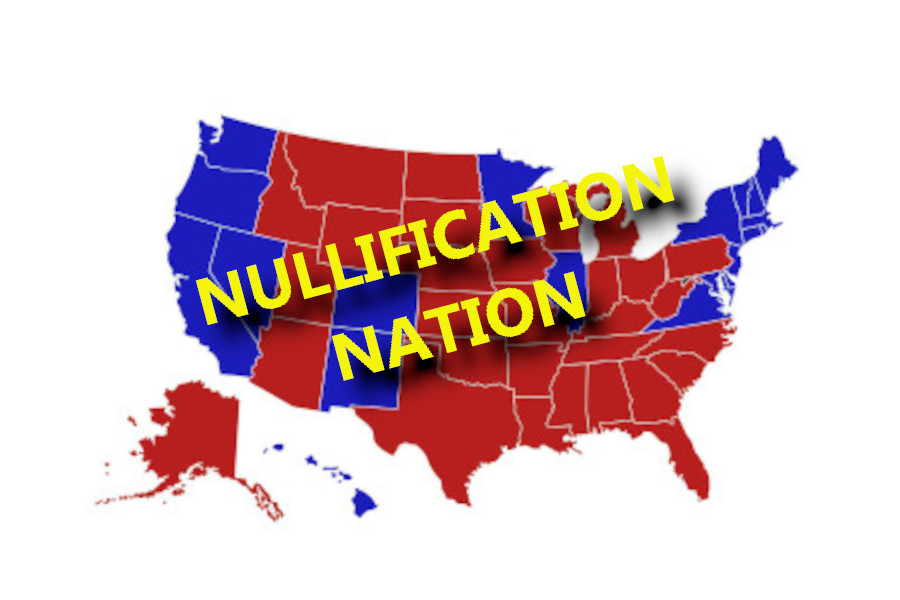In recent years, America has witnessed a resurgence of a phenomenon with roots deep in its history: nullification. This concept, wherein states, counties, and cities choose to ignore or resist federal laws they disagree with, has gained traction across the nation. We see this in the emergence of “gun rights sanctuaries” and “illegal alien sanctuaries.” These acts of defiance represent a quiet civil war, not fought with bullets, but with statutes and ordinances.
Historical Context of Nullification
The idea of nullification isn’t new. It harkens back to the early 19th century, when states like Wisconsin asserted their right to nullify ‘Fugitive Slave Act of 1850’ they deemed unconstitutional. Although the doctrine was never fully legitimized, the notion that local governments could challenge federal authority has remained a persistent undercurrent in American politics.

Gun Rights Sanctuaries
In recent years, the debate over the Second Amendment has intensified, leading many jurisdictions to declare themselves “gun rights sanctuaries.” These areas assert that they will not enforce certain federal or state gun laws that they perceive as infringing upon citizens’ constitutional rights.
- Effingham County, Illinois: On April 16, 2018, Effingham County declared itself a “sanctuary county” for gun owners. This move inspired over 60% of counties in Illinois to adopt similar resolutions, demonstrating a widespread grassroots pushback against perceived overreach in gun control laws.
- Yavapai County, Arizona: On March 6, 2019, Yavapai County joined the movement, with the Board of Supervisors passing a resolution affirming their support for the Second Amendment. This action reflects the sentiments of many Arizonans who view federal gun regulations as an infringement on their constitutional rights.
Sanctuary Cities for Illegal Aliens
Conversely, we see cities and states across America declaring themselves sanctuaries for illegal aliens, refusing to cooperate with federal immigration enforcement. This movement is a response to what some see as overly harsh immigration policies.
- San Francisco, California: As early as 1989, San Francisco adopted a sanctuary policy, prohibiting city employees from using funds or resources to assist federal immigration enforcement. This policy was solidified in 2013 with the “Due Process for All” ordinance.
- New York City, New York: In 2014, New York City passed a law limiting the city’s cooperation with federal immigration authorities, reflecting a commitment to protect immigrant communities from federal policies perceived as unjust.
The Implications of Nullification
The actions of these states, counties, and cities illustrate a deep-seated tension within the United States. The quiet civil war isn’t characterized by violent conflict but rather by a profound ideological divide over the role of government and the interpretation of constitutional rights.
Proponents of gun rights sanctuaries argue that their actions are necessary to preserve individual liberties in the face of government overreach. Meanwhile, advocates for sanctuary cities claim they are upholding human rights and protecting vulnerable populations from federal policies they deem inhumane.
The Consequences of a Divided Nation
This quiet civil war poses significant challenges to the fabric of American federalism. It raises critical questions about the balance of power between local and federal governments. As these nullification efforts grow, the potential for conflict increases, with federal authorities and local jurisdictions often at odds.
Ultimately, this situation underscores the importance of dialogue and compromise in American governance. While nullification efforts may offer a temporary solution for local governments dissatisfied with federal policies, they also risk deepening the divisions that threaten to fracture the nation.
Conclusion
It is vital to recognize that the complexities of governance require more than unilateral action. The quiet civil war may not be as audible as the clashing of armies, but its reverberations are felt throughout the nation. Whether through the sanctuary for guns or immigrants, America is wrestling with its identity and the principles that have long defined it. The path forward demands careful consideration of both history and the future, seeking solutions that unite rather than divide.
As we navigate these turbulent waters, it is crucial to remember that the strength of the United States lies in its ability to reconcile differences, finding common ground amidst the cacophony of conflicting ideals. In the meantime, exercising nullification has more advantages, than disadvantages. It offers a voice to exercise control for individuals and their local community ideals.
So, no matter where you and your community falls on the spectrum of societal opinions… continue to boldly exercise nullification. However, be prepared to live with the consequences of your choices.
If you liked this article and want to learn more… we suggest reading this fantastic book by Tom Woods. https://a.co/d/6TccvqP


